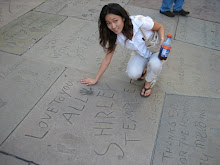However, the same effect takes places when we try to recollect what each letter stands for, especially if the same letter represents a different word!
On Wednesday, my boss left me a list of projects that he would like for me to oversee and make my own. He had already left for the day when I came in after class. All I saw were a jumble of acronyms. Frightened, I was. Let's consider "PACS"...now, I know what PACU stands for...Post-Anesthetic Care Unit. But, how was I to know that PACS is an acronym for Picture Archiving and Communication Systems?!
Luckily, I was leisurely reading "Healthcare Informatics" when I came home later that day. Lo and behold! I found an article in the table of contents titled "PACS Centralization" Quickly, I turned to page 64 and scanned the first few paragraphs and found out. You would laugh if you saw the excited expression on my face as I sat alone in my apartment reading a trade magazine.
This weekend I saw a copy of Health Data Management magazine and the cover story is titled "The Value of Speaking the Same Language." (Isn't it simply fabulous how these articles fall into my hands when I need them most?) I absolutely adore the cover art for the magazine, so as soon as I find my camera, I will take a picture and upload it.
The article starts off like this...
"What in the world is the difference between an 'electronic medical record,' [EMR] 'electronic health record' [EHR] and 'personal health record' [PHR]? What's the difference between a 'regional health information organization' [RHIO] and a 'health information exchange' [HIE]?"
Did you know that the Department of Health and Human Services funds two work groups that are working to standardize the use of these words within the industry? RHIOs and HIEs are being handled by the Networks Work Group. The Records Work Group is working on the EMRs, EHRs and PHRs. The name of the work groups gives you a clue to what each deals with.
The article goes on to talk about how industry professionals use these acronyms interchangeably, depending on their audience and how diverse they want to be perceived as. There are legal issues as well. Federal and state I.T. grants are available to healthcare organization and they use these terms. But if everyone uses them interchangeably, who really knows what is being funded and what is being rejected?
All of this is so complex and confusing...I wish I were a part of those workgroups. I think it would be fascinating to come to a conclusion and set a standard definition for these acronyms. Once these terms are clearly defined, the nation can take a leap towards a national database of EHRs which includes every little detail about every little incident at every hospital and doctor's office visits in person's medical history.
Isn't that amazing? Imagine the upgrade in the quality of service you will receive at your next office or emergency room visit. You wouldn't have to bother listing off all your allergies to medication and history of operations with your broken wrist proving itself useless.
